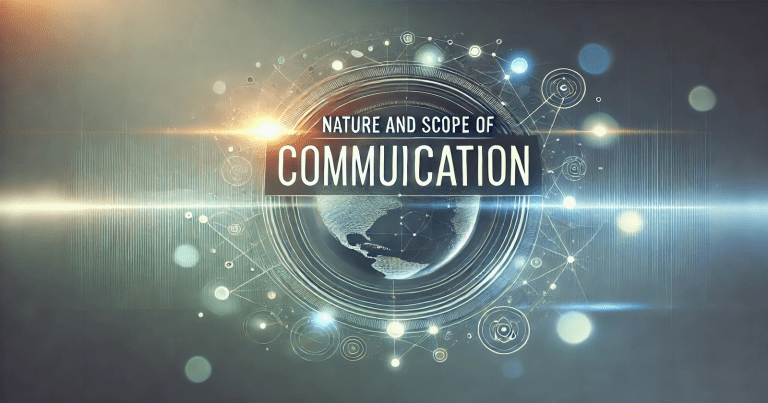Communication refers to the sharing of information, thoughts, and experiences between two people or two groups to mutually understand the intent. From individual relationships to corporate business around the world, there is communication, and each element in a relationship is categorized according to its features and implications, knowledge in this aspect plays an important role in proper communication and good relations. The nature and scope of communication encompasses various elements that define its characteristics and its influence across domains. Understanding these aspects is critical for effective interaction and relationship-building.
Meaning of Communication
Communication is the process of passing information through verbal and written words, non-verbal signals, or other forms. It is the backbone of human interaction as it is used to express ideas, emotions, and objectives. Communication is the process of creating, transmitting, and interpreting messages to ensure understanding between the sender and receiver. It establishes connections, resolves conflicts, shares ideas, and fosters collaboration. In all aspects, both personal and professional, the power of communication fills the gaps between people to achieve mutual understanding.
Nature and Scope of Communication
The nature and scope of communication reflect its dynamic role in personal, professional, and societal contexts. By fostering connection, influencing decisions, and bridging gaps, communication is essential for building relationships and achieving goals.
Nature of Communication
The characteristics of communication give it some intrinsic value to all contexts of application. Eight very important considerations in defining communication include:
- Two-Way Process
It needs a sender and a receiver. There is a necessary role for active involvement on the part of the participants for the exchange to be fruitful.
- Dynamic and Continuous
It changes over time, adapting to new situations and participants. The process is not time-bound with a definite start or endpoint.
- Contextual
Meaning in communication changes depending on the situation. Social, cultural, and environmental factors play a big role in the communication process.
- Purpose-Oriented
Communication has particular purposes, such as informing, persuading, and entertaining. Each contact is related to the sender’s or organization’s purpose.
- Universal
Every person, group, and organization needs communication to exist. It is not limited to verbal processes and encompasses body language, graphics, and digital types.
- Interpersonal and Intrapersonal
Intrapersonal communication is between the individual (for example, self-reflection). Interpersonal communication is between two or more people.
- Dependent on Perception
The way people perceive messages depends on their culture, experience, and beliefs. Misunderstandings are often the result of differing perceptions.
Scope of Communication
Communication is very vast, touching almost every aspect of life and embracing various domains. Here are eight areas where the role of communication is transformative.
- Personal Relationships
Effective communication builds up and nurtures relationships. It fosters understanding, conflicts are resolved, and bonds strengthen.
- Business and Corporate Settings
Business companies depend on communication for teamwork, customer interaction, and decision-making. Tools that show its application include emails, meetings, and marketing campaigns.
- Education
Teachers communicate knowledge to students. Educational tools like lectures, multimedia, and online platforms depend a lot on communication.
- Mass Media
Television, radio, newspapers, and digital platforms communicate information to a huge audience. It gives shape to public opinion and impacts social change.
- Healthcare
Communication can make the difference between a well-doctor and patient relationship. It is also key to medical education and public health campaigns
- Cross-Cultural Engagement
Communication bridges cultural boundaries and fosters mutual respect. It serves as a vehicle for global diplomacy and international relationships.
Process of Communication
It involves understanding the process of communication. It is important to understand the sender, message, encoding, decoding, channel, receiver, feedback, and finally noise. Those key elements include the following:
- Sender
- The person who initiates a message.
- Decides what to say and what is meant during communication.
- Message
- What needs to be conveyed?
- Verbal, non-verbal, or written.
- Encoding
- The process of transforming the message into a form that the receiver can understand.
- This includes language, symbols, and body language.
- Medium
- The channel through which the message travels (e.g., face-to-face, email, phone).
- Selecting the appropriate medium is very important for communication.
- Receiver
- The person or group that interprets the message.
- Their response will tell whether the message was successfully conveyed or not.
- Decoding
- Deciphering the coded message to mean something.
- Proper decoding is possible when the language is clear and context is present.
- Feedback
- The receiver’s response to the message.
- It indicates whether the message was received or not.
Importance of Communication
Communication is necessary for personal, professional, and social development. The importance of communication includes the following:
Relationship Development
- It builds trust, teamwork, and sympathy.
- Effective communication heals conflicts and solidifies bonds.
Decision Making
- Leaders require communication to set objectives, get feedback, and take decisions accordingly.
- This facilitates the ability to make appropriate decisions.
Innovation
- Sharing ideas and brainstorming results in effective solutions.
- Organization innovates with successful communication.
Productivity Maximization
- Error-free as well as a successive process goes in hand.
- There is clear communication about what and how their tasks are to be performed.
Public Opinion Shaping
- Public opinion is changed with mass communication.
- Marketing, campaigns, and news media influence people’s thinking as well as their behavior.
Nature and Scope of Communication FAQs
What is the nature and scope of communication?
The nature of communication explains its dynamic, contextual, and interpersonal aspects. The scope includes its use in personal relationships, business, education, and mass media.
Why is feedback important in communication?
Feedback will guarantee that the message is relayed clearly and is received as it was meant to be. It enhances clarity, reduces misunderstandings, and enriches later communications.
What are the types of communication?
Communication is verbal, non-verbal, written, or digital; it may also be formal or informal.
How does communication impact leadership?
Leaders utilize communication to inspire, direct, and resolve conflicts. It is invaluable for fostering teamwork and for organizational accomplishment.
What is the role of technology in communication?
Technology revolutionizes communication by enabling instant connectivity, remote collaboration, and access to information globally.


